Late last year, the Government of Dubai made an interesting announcement, outlining 2022 as the year when the equity market would be unlocked. The statement did not go unnoticed by investors. And true to its word, the Emirate’s leadership soon made fiscal policy changes and launched IPOs with greater intent and resolve.
The most notable among the flurry of IPOs has been that of Dubai Electricity and Water Authority (DEWA), which went public in March this year. DEWA sold 6.5% of its stake (3.25 billion shares) in its initial public offering. It raised $6.1 billion, achieving the distinction of Emirate’s biggest IPO in 15 years. More than 65,000 local, regional, and international investors took part in the public offering.
I believe the DEWA IPO is the first step in Dubai’s ambitious plan to revive its capital markets. Not only is it the biggest-ever listing in the UAE but also the largest listing in the Middle East region since the Saudi state-owned oil giant Aramco went public. Successful IPOs and considerable participation from global retail and institutional investors are indicative of the overall health of the economy. So, what next for Dubai and the larger Middle East?
The road to sustainable growth
Apart from DEWA, as many as 10 other companies are expected to list in the coming months. The list includes toll road operator Salik, telecom software developer Tecom, district cooling company Empower (which is a joint venture between DEWA and Tecom Group), and, possibly, companies within the Emirates Group. This development is not unique to Dubai. Many companies in the Middle East region have attracted big-money investors as evident from a few highly publicized and successful IPOs. According to a report(1), IPOs in ME have raised $4.8 billion this year, compared to just $3.9 billion in Europe.
Take the case of retail pharmacy chain Nahdi Medical of Saudi Arabia — the company made its debut in March with a $1.4 billion IPO, making it the biggest listing in Europe, the Middle East, and Africa in the year 2022. It attracted a staggering $80 billion in orders(2) from institutional investors. Overall, more than $7 billion of foreign capital flowed into Middle East stocks in March.
What caused the windfall?
There are several reasons why the ME is trumping the more established markets when it comes to IPOs and investor interest. The geopolitical situation does not seem to favour the West presently, with the Russian invasion of Ukraine creating a major headache for several European countries. Besides, soaring inflation in developed economies, such as the US and UK, with the latter breaking a 40-year record, has led to high energy and food costs, sucking out liquidity. The resultant hawkish central bank policies have left little appetite for public listings.
On the other hand, high oil prices and significant equity inflows have greatly benefitted the Gulf region, leading to a higher investor appetite for IPOs. The recent movement in oil prices has enabled regional investors to deploy more capital into the share market. Figures tell the story better: Equity benchmarks in UAE and Saudi Arabia gained 5%, or more, this year, while Europe’s Stoxx 600 Index slumped by more than 6%.
Such has been the global interest in the Middle East investment landscape that DEWA, which had planned to offload only 6% of its stake, tripled the number of available shares after seeing global interest in the IPO, from big names such as BlackRock and Vanguard Group and sovereign-wealth funds all the way from Norway and Singapore.
The growing momentum among governments in the Middle East to make their state enterprises public also indicates their resolve to diversify their economies away from oil. Regardless of the reasons, the confidence that investors have shown in the ME region augurs well for future IPOs, which are sure to give a leg up to the entire economy.
- https://www.bnnbloomberg.ca/ipo-boom-in-middle-east-pulls-ahead-of-struggling-europe-market-1.1741699
- https://economymiddleeast.com/news/ipo/



